SOCIETY OF THE CINCINNATI | History Of The Deepstate
The First Shadow Government And America’s Most Controversial Organization, The Society Of The Cincinnati Were Instrumental In Framing The Constitution. Since Its Formation They've Gone On To Be Involved In The Creation Of The Federal Reserve, The Search For The Holy Grail, And 2 World Wars. Still Active Today It's North America Oldest Hereditary Society.
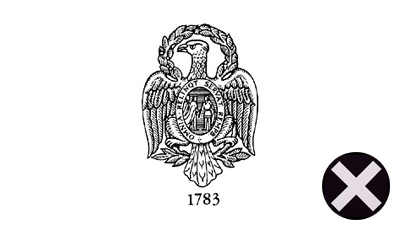
SOCIETY OF THE CINCINNATI
The Society of the Cincinnati was founded May 10th 1783 in New York by the veterans and officers of the Continental Army and navy. The Society, at the time, was America’s most controversial organization. Thomas Jefferson and many other prominent American figures of the day viewed the new organization with suspicion and saw it as a seedbed for a hereditary American aristocracy.
In the months leading up to its creation the officers, who had not been paid for the last four years of the war, began circulating rumors of a military coup. The society, with Washington as President-General, was formed and started to exert political pressure on Congress in a bid to strengthen their chance of receiving their wages. Although George Washington was not directly involved in the creation of the Society, he joined the organization shortly after its formation.
Society of the Cincinnati members have included notable military and political leaders, including 23 signers of the United States Constitution.
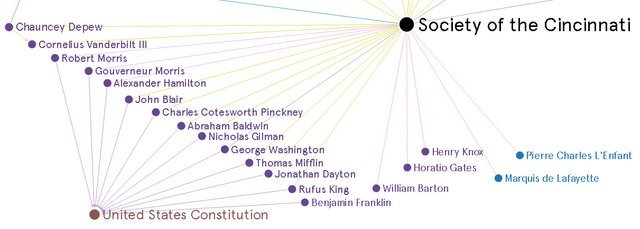
A little time after Major General Henry Knox formed the Society, the general officers of the Continental Army and navy met at the headquarters of Friedrich Wilhelm von Steuben’s (Washington's chief of staff) near Newburg. Many society members were monarchists, and 3 years after its inception Steuben wrote to Prince Henry of Prussia inquiring as to whether he might be interested in becoming king of the United States.
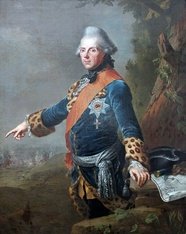
Prince Henry of Prussia
The Cincinnati were seen as the nucleus of a secret government, operating outside republican rules, to the benefit of the few and the detriment of the many.
A conspiracy theory emerged that saw the Cincinnati as a group focused on gaining special financial privileges through commutation. Forming an aristocracy through the rule of descent, and connected to the nobility of Europe through the membership of foreign officers like Steuben and the French society, they met annually to make political decisions, and then enforcing those decisions through political influence and military power.
Within 12 months of the founding, a constituent Society had been organized in each of the 13 states and 1 in France.
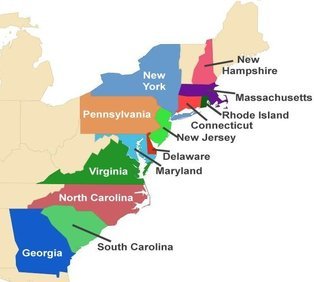
Mirroring the structure of the 13 American federal states, the society was divided into a national organization of 13 US state societies, and 1 French. Most of the Cincinnati's work takes place at the state level, with general coordination happening at national level. The original members of the Cincinnati were among those developing many of America's first and largest cities to the west of the Appalachians, most notably Cincinnati, Ohio, Pennsylvania and Pittsburgh.
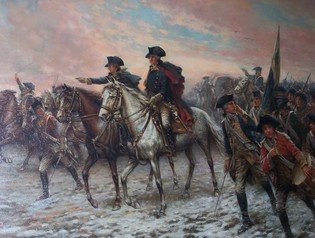
About 2,150, out of about 5,500 men originally eligible for membership, joined within a year. Membership was generally limited to officers who'd served at least three years in the Continental Army or Navy, including officers of the French Army and Navy above certain ranks. Members of the larger fighting forces comprising the Colonial Militias and Minutemen were not entitled to join the Society.
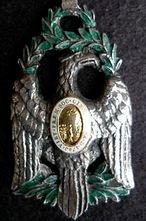
Pierre L'Enfant, who famously designed the Washington DC street plan, traveled to France with his design for the Cincinnati's new badge. King Louis XVI ordained the French Society of the Cincinnati, which was organized on July 4, 1784 (Independence Day). Up until that time, the King of France had not allowed his officers to wear any foreign decorations, but he made an exception in favor of the badge of the Cincinnati.
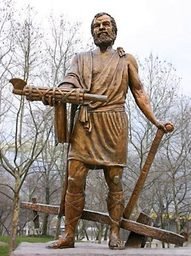
The society's name was inspired by Lucius Quintius Cincinnatus (519–430 BC), a Roman patrician, conservative statesman, and military leader of the early Roman Republic. After retiring from service he worked on his farm until an invasion prompted his fellow citizens to call again for his leadership. He agreed and assumed full control of the state later resigning his near and absolute authority following his victory. He has often been cited as an example of manliness, outstanding leadership and civic virtue.
John Farmer and the Making of American Genealogy | Francois Weil
Burke predicted that “a hereditary peerage” would “be settled as firmly in each potent family, and riveted in our government, as any order of nobility is in the monarchies of Europe.” In sum, the society’s creation was a divorce “from our open professions of republicanism.” In March 1784 the Massachusetts legislature condemned the Cincinnati “for tending, if unrestrained, to Imperium in Imperio"
imperium in imperio: A government, power, or sovereignty within a government, power, or sovereignty.
CRITICISM
Although he remained a member of the Society until his death, Washington received criticism from both sides. The Society and the Constitution accused him with "wanting in patriotism" and desiring to "subvert the principles of a republican government. In New England, extralegal conventions protested commutation as a policy designed to privilege a specific class of citizens over another; the Cincinnati became the focal point of these accusations. In South Carolina, Judge Aedanus Burke published a widely read pamphlet that described the society as a nascent nobility.
While Burke acknowledged the heroism of the veteran officers, he feared that their descendants would be less virtuous and eventually constitute an aristocracy that would doom republican government.
In 1783 he published two pamphlets, An Address to the Freemen of South Carolina - January 1783 and Considerations on the Society or Order of Cincinnati - October 1783, under the pseudonym Cassius where he criticized the Society of the Cincinnati for being an attempt at reestablishing an elite hereditary nobility in the new republic. Both sparked a general debate that included prominent names like Thomas Jefferson and John Adams.

CONSIDERATIONS ON THE SOCIETY OR ORDER OF CINCINNATI
THE following publication is intended to convey a few observations to my fellow citizens, on a new Society or Institution lately established throughout the continent, composed of the Major-Generals, Brigadiers, and other Officers of our army. It is instituted by the name of "THE SOCIETY OF THE CINCINNATI;" and it has [grown] to considerable strength and maturity already. For besides the Grand or General Society of this order, a subordinate or State Society is established in each state, and these again subdivided "into such districts as shall be directed by the State Societies.
SINCE the foregoing publication with the press, a set of "Rules and Bye Laws of the Society of Cincinnati established in South-Carolina," have been printed and handed about in this city. I have perused their rules and I am more convinced than ever, that the institution is one of the most extraordinary factions, which the story of republics furnishes any account of; that my notion of it, my argument on the subject, and my apprehensions concerning its consequences, are well founded. I shall transcribe the first role, and conclude with a few remarks. It runs thus:
"The State Society accedes to the propositions and rules transmitted to Maj. Gen. Moultrie, by Maj. Gen. Heath and Steuben, respectively, on the 20th May and—day of June last with this reservation, that if the said propositions or rule, should by any construction be held obligatory on the society, to interfere in any shape whatsoever, with the civil polity, of this or any of the United States, or the United States in general, this society will not deem themselves bound thereby: They prizing too highly the civil liberties of their country, and their own rights as citizens, to consent that a military society, should in any sense dictate to civil authority?"
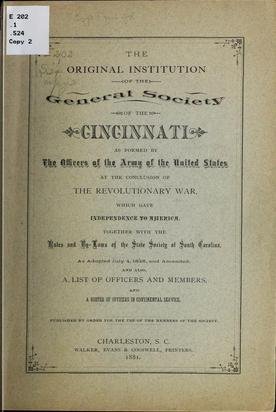
Although members admitted no ulterior motives, critics found the Society to be anti-egalitarian and, at worst, a nefarious shadow government seeking to overthrow the Confederation.
Benjamin Franklin, and other early Cincinnati critics, saw the Society's hereditary membership, European-styled medal, and growing popularity among officers of the French armed forces, as the foundation of an American nobility. He was concerned about the creation of a quasi-noble order, and of the Society's use of the eagle in its emblem, as evoking the traditions of heraldry and the English aristocracy. In a letter to his daughter ,Sarah Bache, Franklin commented on the ramifications of the Cincinnati:
From Benjamin Franklin to Sarah Bache | 26 January 1784
My dear Child.
Your care in sending me the news-papers is very agreeable to me. I received by Captn. Barney those relating to the Cincinnati. My opinion of the institution cannot be of much importance. I only wonder that when the united wisdom of our nation had, in the Articles of Confederation, manifested their dislike of establishing ranks of nobility, by authority either of the Congress or of any particular state,6 a number of private persons should think proper to distinguish themselves and their posterity, from their fellow citizens, and form an order of hereditary Knights, in direct opposition to the solemnly declared sense of their country.
But the absurdity of descending honours is not a mere matter of philosophical opinion, it is capable of mathematical demonstration. A man’s son, for instance, is but half of his family, the other half belonging to the family of his wife. His son too, marrying into another family, his share in the Grand son is but a fourth; in the great grandson by the same process it is but an eighth. ..... Thus in nine generations which will not require more than 300 years, (no very great antiquity for a family) our present Chevalier of the Order of Cincinnatus’s share in the then existing knight will be but a 512th part;
002, 004, 008, 016, 032, 064, 128, 256, 512, 1022, etc
One thousand and twenty two men and women contributors to the formation of one knight. And if we are to have a thousand of these future knights there must be now and hereafter existing one million and twenty two thousand fathers and mothers who are to contribute to their production,
I hope therefore that the order will drop this part of their project, and content themselves as the Knights of the Garter, Bath, Thistle, St Louis, and other orders of Europe do, with a life enjoyment of their little badge and ribband, and let the distinction die with those who have merited it. This I imagine will give no offence.
Amending the Rules

Hamilton, Washington, Jefferson
In light of the accusations, Washington consulted Thomas Jefferson who advised him to change the organizations constitution"to render it unobjectionable." To that end, Washington offered a series of changes at the Society's May 1784 general meeting, including the abolition of hereditary membership, the transfer of funds to the administration of state legislatures, and the elimination of national meetings.
Observations on the Institution of the Society - Washington | May 1784
- Strike out every word, sentence, and clause which has a political tendency.
- Discontinue the hereditary part in all its connexions, absolutely , without any substitution which can be construed into concealment, or a change of ground only ; for this would, in my opinion, encrease, rather than allay suspicions.
- Admit no more honorary Members into the Society.
- Reject subscriptions, or donations from every person who is not a Citizen of the United States.
- Place the funds upon such a footing as to remove the jealousies which are entertained on that score.
- No alterations short of what is here ennumerated will, in my opinion, reconcile the Society to the Community—whether these will do it, is questionable.
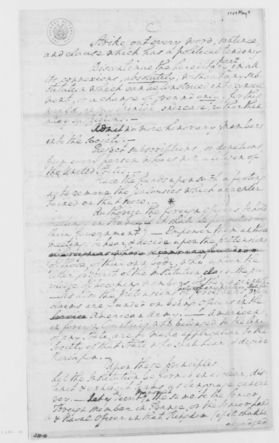
The suggestions were reluctantly approved by the general meeting and passed on to state Societies for their adoption. Publication of the reforms quietened some public negativity, although many of the state societies either refused to adopt, or later reversed the modifications. Below are further correspondence from various government officials outlining their concerns for the Society of the Cincinnati.
From George Washington to Thomas Jefferson | 8 April 1784
Dear Sir,
If with frankness, and the fullest latitude of a friend, you will give me your opinion of the Institution of the Society of Cincinnati, it would confer an acceptable favor upon me.
From Thomas Jefferson To George Washington | 16 April 1784
Dear Sir
I received your favor of the 8th inst. by Colo. Harrison. the subject of it is interesting, and, so far as you have stood connected with it, has been matter of anxiety to me: because whatever may be the ultimate fate of the institution of the Cincinnati, as in it’s course it draws to it some degree of disapprobation I have wished to see you stand on ground separated from it; & that the character which will be handed to future ages at the head of our revolution may in no instance be compromitted in subordinate altercations
What is to be done with the Cincinnati: is that order of Chivalry, that Inroad upon our first Principle, Equality, to be connived at? It is the deepest Piece of Cunning yet attempted. - John Adams
From Samuel Adams to John Adams | 16 April 1784
I am fully in the Sentiment expressd in your joynt Letter Sept 10th, that now we have regular & constitutional Governments, popular Committees and County Conventions are not only useless but dangerous. They served an excellent Purpose & were highly necessary when they were set up. I shall not repent the small Share I then took in them. But what think you of the District & State Conventions of the Cincinnati, & of the Cincinnati in Congress assembled? Do not these Assemblies convene expressly to deliberate & adopt Measures on great and National Concerns proper only for the Cognizance of the United States in Congress assembled, and the different Legislators & officers of Government? And will they not, being an Order of Military Men, too soon proceed to enforce their Resolutions, not only to the lessening the Dignity of the States in the Eye of Europe, but the putting an End to their free Existence! The order is very unpopular here. By the inclosd you will see the Sentiments of our Genl Court. The Governor of So Carolina in a late Speech to his Assembly inveighs against them with the Vehemence of Luther.
From John Adams to Samuel Adams | 25 June 1784
I am as much afraid of District & state Conventions and of the Cincinnati, as you are, and hope they will be laid aside: The last which is an order of Chivalry, and more, will have many very unhappy Effects, besides exciting Contests and Dissentions if not relinquished or suppressed.
Antifederalists revived strong criticism of the Society in 1787 when they proclaimed the new Federal Constitution as the fruition of the Society's plans to overthrow the national government.
The influence of the Cincinnati members and former officers of the Continental Army was a concern for a lot of citizens. When delegates to the Constitutional Convention were debating the method of choosing a president, James Madison (the secretary of the Convention) reported the following speech of Elbridge Gerry of Massachusetts:
The Debates in the Federal Convention of 1787 | reported by James Madison | July 25 1787
A popular election in this case is radically vicious. The ignorance of the people would put it in the power of some one set of men dispersed through the Union & acting in Concert to delude them into any appointment. He observed that such a Society of men existed in the Order of the Cincinnati. They are respectable, United, and influential. They will in fact elect the chief Magistrate in every instance, if the election be referred to the people. [Gerry's] respect for the characters composing this Society could not blind him to the danger & impropriety of throwing such a power into their hands.
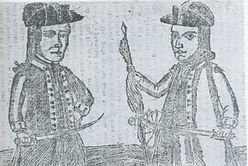
In 1787, the Cincinnati were suspected of starting Shays’ Rebellion, only putting a stop it after impressing upon the populace the need for a stronger national government.
- Shays' Rebellion was an armed uprising in Massachusetts (mostly in and around Springfield) during 1786 and 1787. Revolutionary War veteran Daniel Shays led four thousand rebels (called Shaysites) in an uprising against perceived economic and civil rights injustices. In 1787, the rebels marched on the United States' Armory at Springfield in an unsuccessful attempt to seize its weaponry and overthrow the government.
- The rebellion took place in a political climate where reform of the country's governing document, the Articles of Confederation, was widely seen as necessary. The events of the rebellion affected debates at the U.S. Constitutional Convention, and ultimately the shape of the new government.
That same year in Philadelphia the annual meeting of the society took place the convention that drafted the Constitution was in progress. Given Washington’s position as president of the Cincinnati and chairman of the Federal Convention, and the fact that several delegates were also members of the society, there was plenty of room for suspicions.
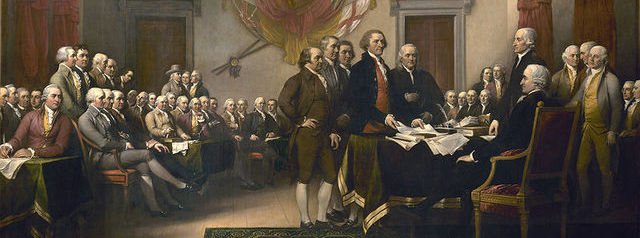
During the debates about the ratification of the Constitution, radical Anti-Federalists repeatedly claimed that the new political system was the work of the Cincinnati, a new attempt to establish an aristocracy in the United States, with the presidency as a transitional institution that would eventually lead to a monarchy. Critics saw this as the genesis of a new nation ruled by the Society of the Cincinnati.
Over the following years the accusations against the society faded and most state societies reverted back to the formerly controversial succession by heredity. Their numbers dropped in the first half of the 19th century but experienced a comfortable growth after the 1850s and are still very much active to this day.

COMING UP IN PART 2
The Modern Day Society of the Cincinnati
Since before the framing of the Constitution this institution, in one form or another, has been ingrained into the very fabric of American society. In part 2 we will be using a fully interactive nodal graph (see below) to explore the recent history of the Cincinnati and look at their involvement in many of the modern day military, religious and global decisions the world has faced over the last one hundred years.
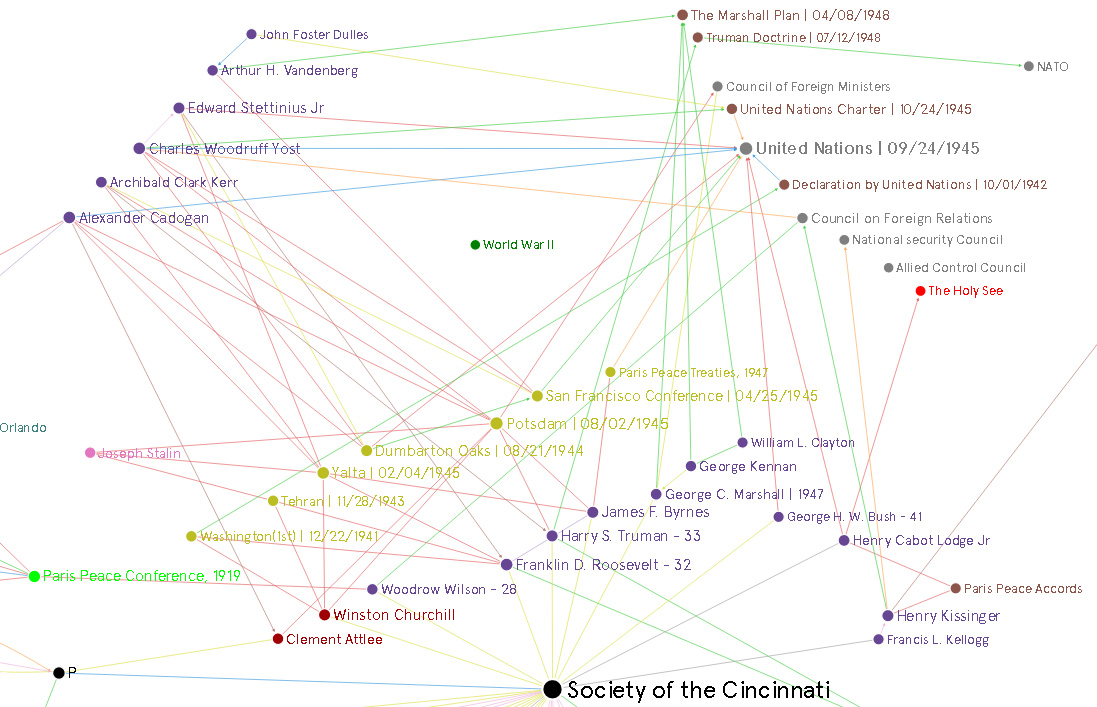
...TO BE CONTINUED

Very interesting! I even didn't know about this society.... they are sooo many! Too many I would say ;)
Thanks for sharing @fortified. Following you, looking forward to read more about it.
edit: Thinking now... they created this in 1783 in USA and 1 part in France... so the France revolution start 6 years later. Coincidence??? I have a book (well the pdf) from 1798 titled "Proofs of conspiracy" that talks about how the the Masonry was changed in the continent by the germans illuminatis (it is the name he use in the book) and how they influenced the France revolution.... all this dates looks too close to me for to be just a coincidence.... I found the book in Archive.Org. Here is the link to a not so heavy pdf https://archive.org/details/proofsofaconspiracy
Ah great stuff. You're really on the ball. I touch on much of this in part 2. Thanks for the links.
No problem, a pleasure... I really like to read about history since i am a child... and after the 2 WW most of the history books or that had to be with historical moments are ... not telling the true I could say so I always look for olders books to really know what happens ;)... I am just curious for nature :D
Yes the people that win the wars also write the history unfortunately.
Curiosity makes the world a wonderful place full of hidden surprises.
Big true but also you have to be strong to accept some things that you could never would imagined that could(can) happens... it is really hard sometimes for me, to tell you the true. When you start to realize we live in a world of deception to accept to be part of this "modern society" is not easy ...
It's not easy you're right. But the hardest part about change is waking up and realizing things need to change. Once that happens you feel a lot more free.
This is true and the most important for me... I really like to be free ;) Cheers man, looking forward to the 2nd part!
pardon my ignorance but I thought that perhaps the deep state emerged around the time the US became a global super power (WW2)
It's fascinating to see that not long after the drafting of the constitution that a secret society / shadow government quickly materializes
Yes it's almost as if the US has been lied to from day one. In the next part I go into the main players behind the ww2 in relation to the Society and the major decisions made.
I haven't read it yet but I will. @v4vapid resteemed brought me here. I'm quite knowledgeable about secret society but I don't remember ever hear of that one. They really control everything possibly from time immemorial, well warlords as I call them, existed since forever and the history of civilization really his their history.
I follow you fortified.
Ah hello. Good to meet you. Yes I've mentioned them to a few people but no one has ever heard of them. It seems odd.
Hi ya. Was just doing my rounds in my comments and saw this again. Wondered if you had a chance to read it yet? I'd be interested to know what you think especially as it as a french connection.
Thanks
@fortified
I'm glad you came back to me. I had forgotten to read it. It was a pretty interesting read about a part of history I didn't knew about.
Ah nice. Thanks. I glad you enjoyed it. It surprises me more people don't know about it. It seemed quite a bit deal at the time.
Thanks for taking the time to read.
@fortified
Upvoted and resteemed very well done :)
Thanks.
Second part gets a lot worse. They've had their hand in everyfuckinthing since day 1 and before.
Good work. I hadn't heard of this society before today. There are so many of these societies and many of them are intertwined.
I'm glad that you mentioned the design of Washington DC. George Washington was of course a freemason.
I'm looking forward to your next article - well done.
Thank you kindly.
Yes it's one I have been researching for a while. It surprising how little it's known about considering the controversy it's caused over the years.
Next part should be out in 3 days. I need a little break from a computer screen after compiling this first part.
Stay tuned..
A crazy amount of work have gone into this work. I'll read later. Thank you for sharing. I hadn't heard about it either. Their numbers are infinite. Anyone who has some privileged knowledge would be their own secret society back then.
It was a lot of research on and off over the last few months. Then it took week to compile it. But it was worth it. It feels good knowing all this information is on the blockchain.
I notice you have french in your profile description. If you're french you might be interested to know that The society of the Cincinnati has a French connection through Generals Lefyette and L'Enfant. The second part touches on the French revolution.
Thanks for taking an interest.
Enlightening read. Looking forward to part 2. Upvoted, Followed and Re-Steemed
Quite an interesting read, and so well sourced. That is a lot of work, and it is much appreciated. Look forward to part 2. Upvoted, followed and resteemed. Thx.
Respect. Thank you kindly.
Great post! Upvoted :)
Amazing stuff, you really know a lot about it! Upvoted and Followed
Thanks pal. appreciated.
Ayyyy this is the content I live for buddy. American history and elites trying to mess it up :)
Looking forward to Part 2 :)
Ah good stuff. Well you've come to the right place.
Part 2 should be out in the next 36 hours. Its a lot to compile.
Heck yeah I can't even imagine. If its the same quality as this holy smokes I gotta nominate it for @ocd . This one has too much traction for a nomination ya dig my friend, good problem to have though :)
lol. Yeah I understand. No probs. I don't mind throwing you some good underrated content from other users your way when I come across some if you want.
Heck yeah buddy I really appreciate that. I'm in Discord most of the day or email is [email protected] whatever is clever my friend. Thanks again looking forward to the next one. I am printing this one out for my Dad to read (he's not so techy) and I'll bring it to him next time I see him :)
Amazing. Let me know what he thinks.
Thanks again.
Absolutely will do. His brother (my uncle) just passed away today) so he needs some great reading material to keep him grounded ya know buddy
Resharing @phibetaiota
Respect